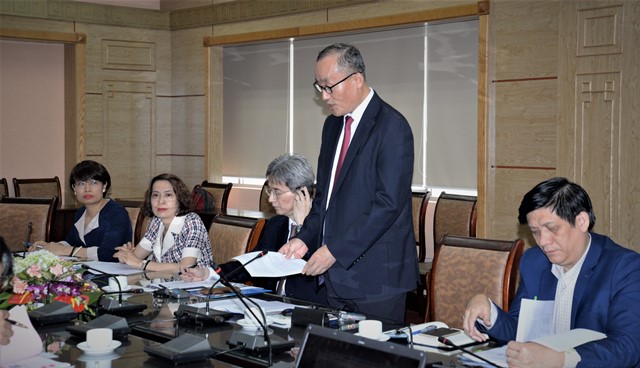I’d like to take this opportunity to congratulate this great initiative jointly organized by the Ministry of Health and Ministry of Construction to push forward the process for total ban of asbestos use in Viet Nam.
Asbestos has long been recognized as a carcinogen causing two third of occupational cancer deaths. According to the latest estimates in 2016, globally asbestos use resulted in over 220,000 cancer deaths representing roughly 2/3 of total global cancer deaths. Viet Nam also recorded more than 2,000 death cases due to asbestos use.
Understanding the needs to protect public health from harms of asbestos use, WHO has advocated and provided technical assistance towards the total ban of asbestos in Viet Nam since 2010. WHO’s support focused on providing evidences on harms of asbestos including white asbestos, experiences from different countries in legislating a ban; improving diagnosis of asbestos related diseases, as well as advocating for support from leaders of the government to ban asbestos.

The advocacy process towards asbestos ban received an important push on 5 August 2014 when WHO and ILO Regional Directors sent joint letter to the Prime Minister urging Viet Nam to ban asbestos by 2020. In September of 2014, Deputy Prime Minister Hoang Trung Hai issued notice 7307 requesting Ministry of Construction to study and develop a road map to stop using asbestos by 2020, and not to object the inclusion of Chrysotile into Annex III of the Rotterdam Convention.
With continuous advocacy and support from experts and partners, Prime Minister Nguyen Xuan Phuc made an important announcement on 16 January 2018 urging Ministry of Construction to develop a road map for stop using white asbestos in roof production by 2023 at the latest. I’m delighted to hear that MOC is progressing towards the finalization of this road map, and the consultation today will contribute to quicken this process.
Ladies and Gentlemen,
We are honoured today to have the participation and technical support of Prof. Ken Takahashi. Professor Takahashi is the Director of the Asbestos Diseases Research Institute (ADRI) in Sydney, Australia.
After graduating from the School of Medicine, Keio University (Japan) and accomplishing clinical residency, he moved to the University of Occupational and Environmental Health, Japan. There he studied and worked for 31 years including 16 years as the Professor of Environmental Epidemiology and Acting then Director of the WHO Collaborating Centre for Occupational Health. He has engaged in epidemiologic research of occupational diseases, with special interest on asbestos diseases.
At ADRI, Professor Takahashi served as Professor of Concord Clinical School, University of Sydney during 2017 – May 2018. He currently serves as the WHO Expert on Chemical Safety/Environmental Epidemiology (International Health Regulations) and has been serving as consultant/advisor to the WHO and other UN specialized agencies on a number of occasions.
Professor Takahashi has been actively supporting WHO and Viet Nam in every step of journey towards the total asbestos ban in Viet Nam since the beginning. He made numerous visits to Viet Nam to provide technical advice for policy makers, Ministries and partners.
Ladies and gentlemen
We have enough scientific evidences to confirm that all types of asbestos including white asbestos cause cancers. We’ve also learnt that the best way to prevent asbestos related diseases is to stop using asbestos completely.
Asbestos is an old toxic technology, which is being abandoned throughout the developed world at a great cost. Unlike tobacco, there are safe substitutes for asbestos that are already being produced in industrial quantities in Viet Nam, ironically mostly used for export.
Viet Nam as a growing middle-income country should be able to afford providing its people, including most vulnerable, with safe asbestos-free roofing for houses. Non-asbestos roof sheet technology developed in Viet Nam is an opportunity for local jobs and for Viet Nam to position itself in green industry in the region. Increasing scale of production will also decrease the price for the non-asbestos products, making it more affordable for the poor.
It’s now a critical time to take actions in implementing this important decision to protect the health of the people.
I’d like to take this opportunity to present to Vice Ministers of Health and Construction the special publication on “white asbestos: its burden on health and environment”. This publication compiled important evidences on burden of asbestos contributed by well-known national and international experts, as well as WHO’s recommendations for total ban of asbestos in the interest of public health.
Thank you
